
How does MRAM work?
MRAM (magnetoresistive random access memory) operates by using two magnetic layers separated by an insulating layer. These layers can align in the same or opposite directions, altering the resistance and allowing the memory to store data as 0s and 1s. MRAM is fast, enabling data to be read and written in about 35 nanoseconds. It supports frequent writing without degradation. Additionally, it retains data when powered off and functions across a wide range of temperatures.
How is MRAM different from other non-volatile memories?
Compared to other memory types, such as battery-backed SRAM, MRAM has distinct advantages. If the SRAM battery fails, all data is lost, and its read and write capabilities are limited. In contrast, Everspin MRAM is persistent and supports unlimited read and write cycles. Ferroelectric memory, another option, performs well at low voltages but can face reliability issues at high temperatures. MRAM, however, operates reliably across a broad temperature range, preserving data safely even during unexpected power failures.
How are the two types of MRAM different?
Toggle MRAM and spin-transfer torque (STT) MRAM are distinct in their operation. In toggle MRAM, a magnetic field switches the direction of the top magnetic layer, known as the free layer, while the bottom layer remains fixed. For STT MRAM, the direction is altered by passing a current through an insulating layer between the two magnetic layers.
Toggle MRAM cannot be miniaturised extensively due to the size required to generate the magnetic field for switching. It is available in sizes ranging from 128 kilobits to 16 megabits. STT MRAM, on the other hand, can be scaled smaller with technological advancements, is available in sizes from 16 megabits to 128 megabits, and even up to 1 gigabit, making it suitable for replacing traditional RAM.
This story is from the November 2024 edition of Electronics For You.
Start your 7-day Magzter GOLD free trial to access thousands of curated premium stories, and 9,000+ magazines and newspapers.
Already a subscriber ? Sign In
This story is from the November 2024 edition of Electronics For You.
Start your 7-day Magzter GOLD free trial to access thousands of curated premium stories, and 9,000+ magazines and newspapers.
Already a subscriber? Sign In
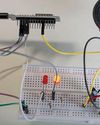
ESP32-Powered AUDIO-VISUAL SIREN
This sound alternator is designed to simulate the effects of a police siren, combining sound and light to create a dynamic audio-visual experience.
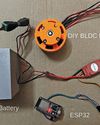
BLDC MOTOR With Web-Based Speed Control Using ESP32
Integrating wireless control into brushless direct current (BLDC) motor systems opens up exciting possibilities for applications such as remote-controlled cars, robots, and other innovative systems.
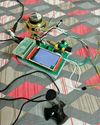
Pi Zero Portable BILINGUAL TRANSLATOR
This system is designed as a bilingual translator, leveraging the gTTS library to support multiple Indian languages, including English (en), Bengali (bn), Gujarati (gu), Hindi (hi), Kannada (kn), Malayalam (ml), Marathi (mr), Tamil (ta), Telugu (te), and Urdu (ur).
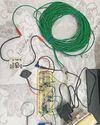
Op-Amp-Based VEHICLE THEFT DETECTOR
A simple, low-cost device can effectively alert homeowners or occupants if a parked vehicle is moved or tampered with.
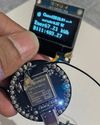
loT SMART METER With Dashboard
Energy meters in homes track electricity usage, enabling accurate billing by governments and providers.

Choose The Right Cloud Platform For Implementing loT PROTOCOLS
Working with loT protocols like MQTT, AMQP, and CoAP on cloud platforms is essential for developing scalable and efficient lol applications. The choice of the programming platform will depend on factors like project requirements, existing skills, and target devices. Leveraging the appropriate libraries and cloud services can enable seamless integration of lol devices with cloud-based applications.

Why TMR SENSORS Lead Next-Generation Design
TMR sensors are gaining traction in industries needing precision and power efficiency. What makes them the go-to choice for modern designs?
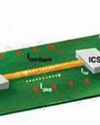
DESIGNING PCBs For EMI Management
Electromagnetic interference can derail your PCB’s performance. EMI management is not just a technical necessity but a hallmark of exceptional PCB design.

CUTTING COSTS, NOT CORNERS: Building Large Scale Applications With Open Source Software
Here are some strategies and best practices for leveraging open source to create enterprise-grade web and mobile applications without sacrificing quality or functionality.

"We Are One Of India's Very Few State Bodies To Manage The Entire Lifecycle Of The Electronics EcosystemFrom Approvals To Subsidies."
What is Gujarat State Electronics Mission GSEM), and how is it attracting major investments in electronics manufacturing, particularly semiconductor manufacturing, to Gujarat? To delve deeper, Electronics For You’s Nijhum Rudra spoke with Manish Gurwani, the head of GSEM. Here is what he revealed...
